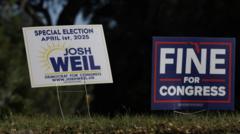With the upcoming April 2 deadline for new tariffs, U.S. businesses are both advocating for reciprocal tariffs and expressing unease about potential retaliatory measures. The focus is on correcting trade imbalances and ensuring fair competition, particularly in the food and energy sectors, while grappling with the unpredictability of Trump's tariff policies.
U.S. Businesses Rally Behind Trump's Tariff Strategy Amid Trade Imbalances

U.S. Businesses Rally Behind Trump's Tariff Strategy Amid Trade Imbalances
As the Trump administration prepares for new tariffs, American firms voice support and concerns over existing trade disparities, particularly with the European Union.
The shelves of American grocery stores are filled with imported jams like St Dalfour strawberry spread and Bonne Maman raspberry preserves, reflecting the $200 million that Europe exports to the U.S. annually. In contrast, American-made jelly struggles to find a market in Europe, with exports totaling less than $300,000 due to hefty EU tariffs exceeding 24%. JM Smucker, a major player in the U.S. jam market, has urged the Trump administration to address these disparities by imposing reciprocal tariffs, arguing that this would "level the playing field" for U.S. producers.
The Trump administration's approach to tariffs, often characterized as knee-jerk and reactive, has sparked significant debate and concern among various industries. While some enterprises support the notion of tariffs to combat unfair practices abroad, they are wary of an all-encompassing strategy that could escalate into a trade war. Smucker's recent communication to the White House is one of many from different sectors, including agriculture and technology, highlighting disparities in global tariffs that hinder American exports.
The ongoing push for tariffs has incited mixed feelings among businesses. Although many are eager for action against foreign competition, they fear the potential for retaliatory tariffs and market instability. Recent discussions suggest that reciprocal tariffs might serve as both punishment for unfair practices and a way to boost American manufacturing, but firms are conscious of unintended consequences.
Some analysts caution against oversimplifying Trump's tariff strategy, emphasizing that his goals can shift dramatically. This unpredictability complicates efforts by U.S. businesses to secure favorable outcomes, as they navigate the balance between advocating for their interests and avoiding repercussions from broad tariff implications.
As the April 2 tariff announcements approach, uncertainties surrounding the administration's ultimate goals remain palpable. Industries such as steel and food manufacturing are actively lobbying for tailored solutions that address their unique challenges without incurring steep costs or retaliatory measures that could diminish profits. Former Commerce Secretary Wilbur Ross believes that clarity will eventually ease business concerns, reinforcing Trump's long-held commitment to tariffs as a mechanism for reducing imports and fostering domestic production.
Despite the traditional support for free trade within the Republican party, Trump's aggressive tariff strategy receives backing as a necessary step toward a fairer trading environment. Advocates argue that fighting for equitable trade practices is essential for American workers and manufacturers, aiding in the pursuit of a level playing field in international commerce.
The Trump administration's approach to tariffs, often characterized as knee-jerk and reactive, has sparked significant debate and concern among various industries. While some enterprises support the notion of tariffs to combat unfair practices abroad, they are wary of an all-encompassing strategy that could escalate into a trade war. Smucker's recent communication to the White House is one of many from different sectors, including agriculture and technology, highlighting disparities in global tariffs that hinder American exports.
The ongoing push for tariffs has incited mixed feelings among businesses. Although many are eager for action against foreign competition, they fear the potential for retaliatory tariffs and market instability. Recent discussions suggest that reciprocal tariffs might serve as both punishment for unfair practices and a way to boost American manufacturing, but firms are conscious of unintended consequences.
Some analysts caution against oversimplifying Trump's tariff strategy, emphasizing that his goals can shift dramatically. This unpredictability complicates efforts by U.S. businesses to secure favorable outcomes, as they navigate the balance between advocating for their interests and avoiding repercussions from broad tariff implications.
As the April 2 tariff announcements approach, uncertainties surrounding the administration's ultimate goals remain palpable. Industries such as steel and food manufacturing are actively lobbying for tailored solutions that address their unique challenges without incurring steep costs or retaliatory measures that could diminish profits. Former Commerce Secretary Wilbur Ross believes that clarity will eventually ease business concerns, reinforcing Trump's long-held commitment to tariffs as a mechanism for reducing imports and fostering domestic production.
Despite the traditional support for free trade within the Republican party, Trump's aggressive tariff strategy receives backing as a necessary step toward a fairer trading environment. Advocates argue that fighting for equitable trade practices is essential for American workers and manufacturers, aiding in the pursuit of a level playing field in international commerce.





















